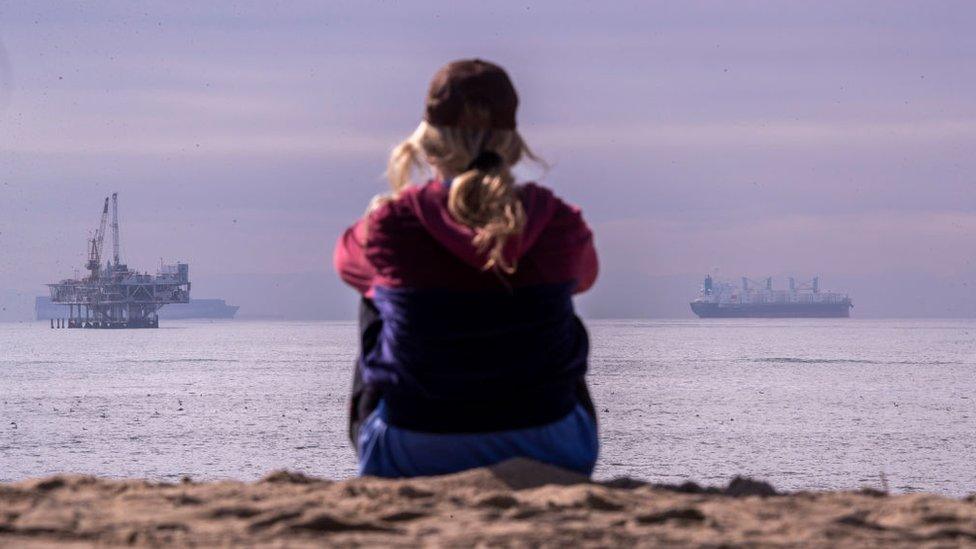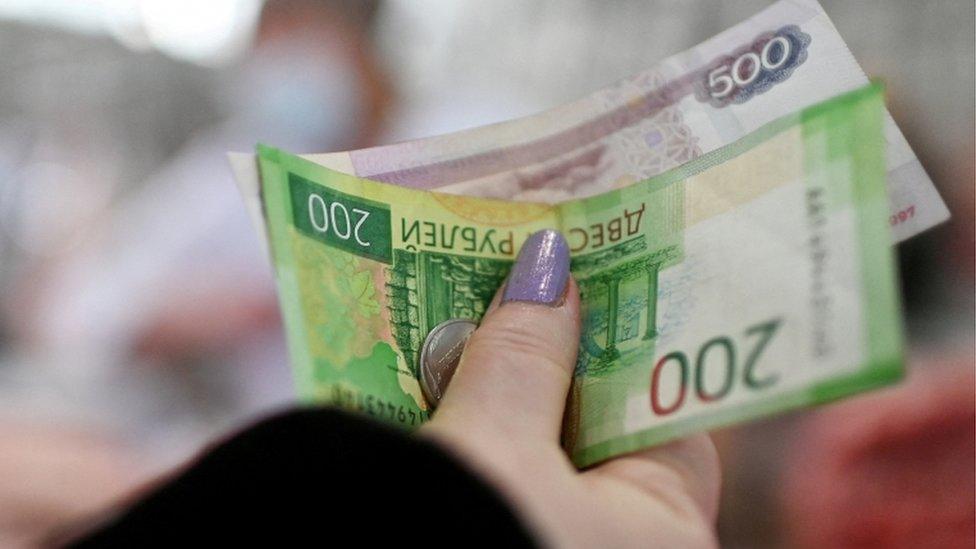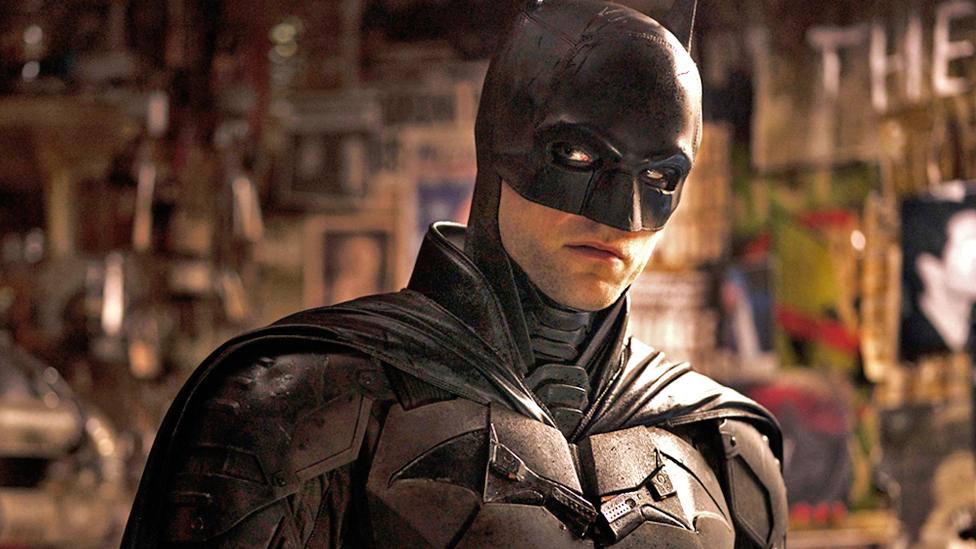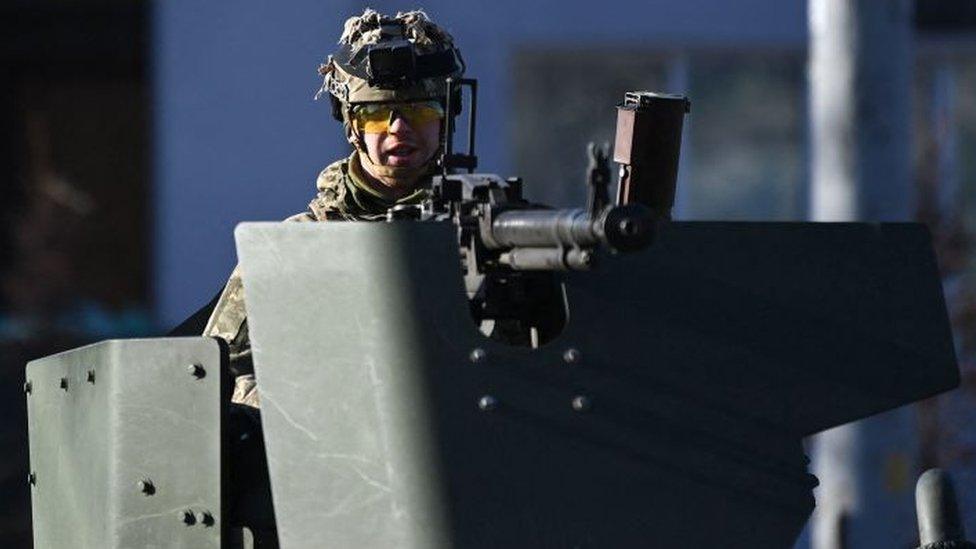Ukraine conflict: Oil hits $113 a barrel despite emergency measures
- Published
- comments

Oil prices have surged despite new measures aimed at calming markets worried by the invasion of Ukraine.
Brent crude - the international benchmark for oil prices - has hit $113 a barrel, marking the highest level since June 2014.
It rose even after the International Energy Agency's members agreed to release 60 million barrels of oil from emergency stockpiles.
Russia is one of the biggest energy producers in the world.
As a result, concerns about Russia's invasion of Ukraine have sparked concerns among investors that oil or gas supplies could be affected.
Meanwhile, the price of US oil - West Texas Intermediate crude - rose to almost $109 a barrel.
The United States and 30 other member countries of the International Energy Agency (IEA) agreed to release the oil in a bid to stabilize energy markets worldwide.
"We are prepared to use every tool available to us to limit disruption to global energy supply as a result of President Vladimir Putin's actions," White House spokeswoman Jen Psaki said on Tuesday.
She added that Washington would carry on looking at how to speed up moving energy supplies away from Russia.
Another statement by the IEA noted that the invasion of Ukraine came against a "backdrop of already tight global oil markets, heightened price volatility, commercial inventories that are at their lowest level since 2014".
Petrol price movements in the UK are mainly determined by the price of crude oil, which is the raw material for fuel, and the exchange rate between the dollar and the pound, because oil is traded in dollars.
On Monday, the RAC said the average price of petrol had jumped to a record high of £1.51 a litre on Sunday, while diesel increased to £1.55.
Jay Hatfield, chief investment officer at ICAP, said the "dramatic" price increases seen globally were unlikely to persist though if the situation in Ukraine becomes more stable.
Sanctions take hold

Share prices across Europe and the US also fell further on Tuesday as attacks on cities in Ukraine continued.
Markets in US, Europe and UK fell amid fears about the impact of the ongoing conflict.
Having been up in early trading, the FTSE 100 turned negative amid the warnings of the consequences of Western sanctions on Moscow and signs that Russia was stepping up its invasion of Ukraine.
Western countries have imposed punishing sanctions against Moscow, with another raft of companies winding down Russian operations and halting investment, such as BP and Shell.
Italian energy giant Eni also said it planned to sell its stake in the Blue Stream pipeline. Eni co-owns the pipeline, which carries Russian gas to Turkey, with Russian energy firm Gazprom.
Meanwhile, French oil and gas group TotalEnergies said it would no longer provide capital for new projects in Russia on Tuesday.
Frankfurt saw steeper losses, which analysts suggested could be linked to Germany's reliance on Russian energy imports.
Russia's currency was stable, however, having collapsed 30% on Monday to record lows against major currencies. One rouble was worth less than one US cent in trading on Tuesday.
The rouble's fall cuts its buying power and hits savings of ordinary Russians. The decline was only halted when Russia's central bank doubled interest rates to make the currency more attractive to investors.
The sanctions' stranglehold on Moscow's finances has hit the central bank's access to a lot of Russia's huge reserves of money held in the form of foreign currencies.
Sophie Lund-Yates, equity analyst at Hargreaves Lansdown, said: "This is a fast-moving situation and investors should be mindful of potential share price volatility in the short to medium term."

Analysis: Rob Young, lead presenter, BBC World Service Business
Russia's invasion of Ukraine has investors on edge.
There is a huge amount of uncertainty about what is likely to happen next, and you can see that in the volatility on markets.
Western sanctions on Russia have caused turmoil in the global banking sector, with firms scrambling to ensure they're not doing business with any sanctioned individual or company.
European and US asset managers who are keen to offload their Russian investments may find it difficult to do so with the Moscow stock exchange currently closed and talk that the Kremlin will prevent foreigners from selling up.
That - together with the lack of revenue from Russian customers - could mean lower profits for western companies, from energy giants to carmakers to investment funds.
Sanctions can hurt both sides, not just the sanctioned.
But many company bosses are clear - decisions are being made, not simply about money, but on moral grounds too.
Meanwhile, the war continues to unsettle the energy markets, with the price of oil now well over $100 a barrel.
An announcement that large stockpiles of crude will be released would ordinarily send prices lower.
Today's news, however, has done nothing to ease market concerns about the potential for shortages of oil from Russia.

Russia attacks Ukraine: More coverage
THE BASICS: Why is Putin invading Ukraine?
RUSSIA SANCTIONS: 'If I could leave, I would'
IN DEPTH: Full coverage of the conflict

Related topics
- Published1 March 2022

- Published1 March 2022

- Published1 March 2022
